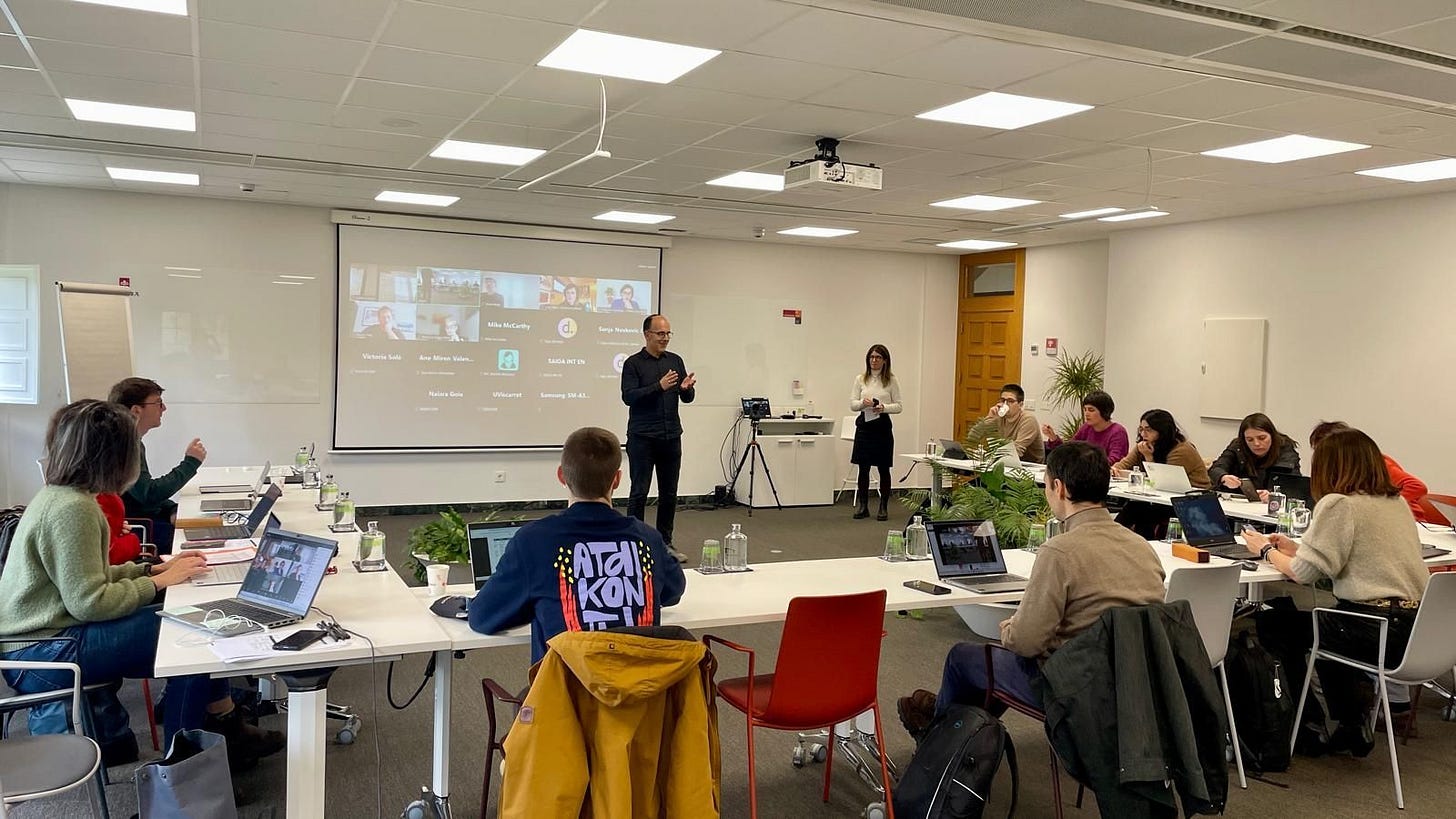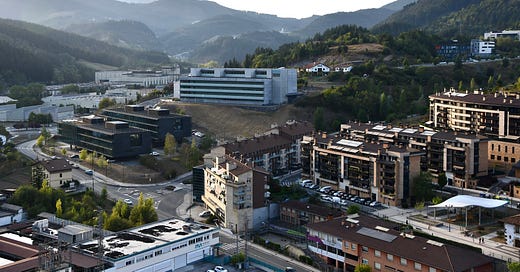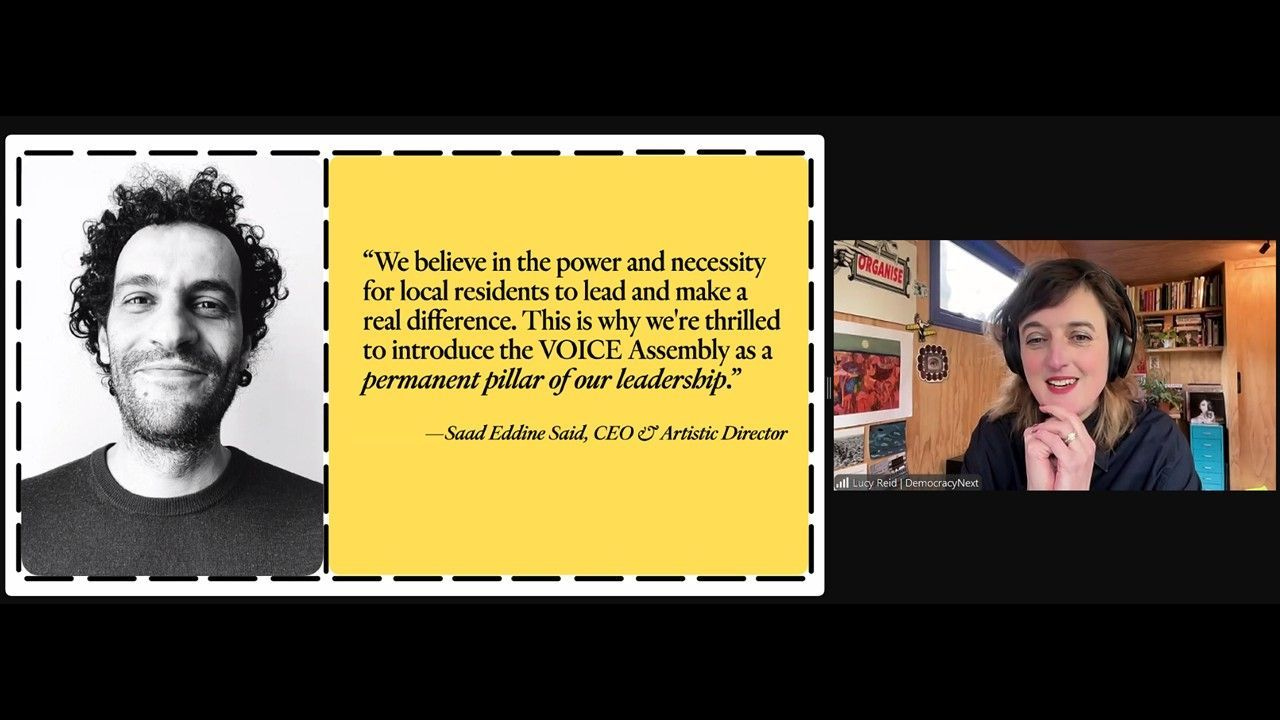Are workplaces the next frontier for deliberative democracy?
Announcing a new collaboration to innovate workplace governance at MONDRAGON, the biggest entity in Spain’s Basque Country
We're thrilled to introduce an exciting new project, aimed at transforming how decision-making happens in the workplace. In collaboration with MONDRAGON, the MIT Center for Constructive Communication (CCC), and Arantzazulab, we’re working to democratise workplace governance through innovative practices and technology. The future of work is collaborative and democratic, and we’re leading the charge!
We already know that the methodology behind citizens' assemblies – random selection from a community, deliberation on expert testimony, taking decisions by supermajority vote – is a great way to find solutions to tough political problems. We've also seen great results when applied to the outreach of institutions like museums and universities.
We are extraordinarily lucky that MONDRAGON Corporation has opened its doors to more pioneering ideas. Already it is the biggest entity based in the Basque Country in Spain, with €11 billion of sales, more than 65,000 workers, and 240 businesses, more than 80 of which are cooperatives.
The main goal is to create more engaged workforces, better decisions, and a stronger sense of community within cooperatives. By tapping into new technologies, we aim to enrich deliberation, ensuring diverse voices are heard, and leveraging tools that enhance collective decision-making - especially in times of complexity.
Our experiments in the workplace aim to replicate the sense of engagement, purpose, and joy that we associate with more policy-related citizens’ assemblies.
Two key pathways guide our work:
Principles of deliberative democracy: We are integrating sortition, deliberation, and rotation into the cooperative structures of MONDRAGON to help make decision-making more inclusive and effective.
Tech-enhanced deliberation: Using AI and other cutting-edge technologies, we’ll help cooperatives enrich their deliberative processes, making participation more accessible, scalable, and effective.

Last week, we kicked off a first hybrid learning workshop with our partners involving people from cooperatives in different sectors, demonstrating the wide scope for fascinating experiments in different contexts: the Basque Country’s largest supermarket with 1.2 million consumer members and 9,000 worker owners; the banking and insurance industry; Mondragon University that has three types of members – students, workers, and project collaborators; as well as an industrial cooperative in the auto industry.
After an introductory presentation about deliberative democracy by DemNext’s CEO Claudia Chwalisz and Arantzazulab’s Managing Director Naiara Goia, we heard from Sonja Novkovic from the International Centre for Co-operative Management, who gave an overview about current challenges in cooperative governance. She said: “Looking at what comes next, deliberative mini-publics and random sampling are expected to be a good fit in large co-ops".
Simon Pek from the University of Victoria offered a few ideas about how “deliberative mini-publics can be tailored to the cooperative context. There are several potential applications: appraising candidates for election, offering feedback to decision makers, and identifying the latest issues relevant to the membership".
DemNext’s COO, Lucy Reid, shared some insights into how museums and cultural organisations in Germany and the UK have been exploring how citizens’ assemblies can democratise their work - and some of the differences between this, and the more familiar practices of co-curation and co-creation.
And Michael McCarthy from the University of California Santa Cruz, and Economic Institutions Fellow at DemocracyNext, shared insights from his groundbreaking work on democratising finance and public banking with the principles behind citizens’ assemblies.
Importantly, MONDRAGON’s leadership has strong support and commitment for governance innovation. Iñigo Iñurrategi Irizar shared that: “We have an opportunity and a drive for experimentation.”
In early April, Claudia Chwalisz and Lucy Reid from the DemNext team will be in the Basque Country for the next phase of our collaboration. We’ll continue learning and begin designing the experiments that will take place this year.
Find out more, and stay tuned as we share insights, lessons, and outcomes from this ground-breaking project!
At DemNext, we’re more widely interested in democratising economic and financial institutions with the principles of deliberative democracy – if you’re interested in collaborating with us, get in touch!
📡 What’s on our radar
🌳 Local councils across the UK are convening more and more citizens' assemblies. Patricia Peller and Alan Renwick explore 42 examples for the University of London's Constitution Unit, finding that 33 of the assemblies tackled climate change or biodiversity, that left-leaning council were more enthusiastic than right-wing ones, and that the assemblies' recommendations had a wide variety of impact on decision-making.
✍🏻 What can we learn from the Ostbelgien Model? Five years after the founding of the world's first permanent citizens' assembly, the scientific observers of eastern Belgium's Parliament of the German-speaking Community have written a dispatch for Deliberative Democracy Digest. Their main takeaway is to keep front of mind the assembly's experimental nature: "always allow enough space and time for flexibility, learning, and adaptation."
🌉 Citizens’ assemblies can help bridge divides and rebuild trust in societies hit by conflict – but they have to be done properly. In a paper in Peace and Sustainability, Nicole Curato, Lucy J. Parry, and Melissa Ross draw critical lessons from Bosnia and Herzegovina's meetings to bring Muslims, Serbs, and Croats closer in Mostar and France's climate assembly after the Yellow Vest civil disturbances.
🔊 We enjoyed hearing Ben Redhead talk on 25 February about how sortition can help in the workplace, organised by the International Network of Sortition Advocates and including comments by academic specialist Simon Pek. An emerging field where there's so much still to learn!
🌸 Recent and upcoming events this spring
🥾 Adventures in Democracy: Can People Power Rewrite the Rules? Monday 14 April, 6pm – 7:30pm at The Conduit and online. Register here.
Erica Benner, a leading political thinker, delves into the past and present of people power, exploring how democratic systems endure challenges and adapt to new pressures.
In conversation with Jon Alexander, author of Citizens, DemNext Advisory Council Member, and a prominent advocate for reimagining democratic engagement, Erica will address critical questions: What does equality mean in a world fixated on wealth and competition? How do we hold those in power accountable? And can we find enough common ground to sustain democracy in the future?







Very excited to see that collaboration. Hopefully it brings great things.
Great work 🙌 excited to see what comes out of this! And for increasingly tech-enabled assemblies it would be good to ensure they are SAAFE, which are human-centred principles for the design and implementation of delib-tech. Currently being developed with University of Southampton - happy to share more in due course.